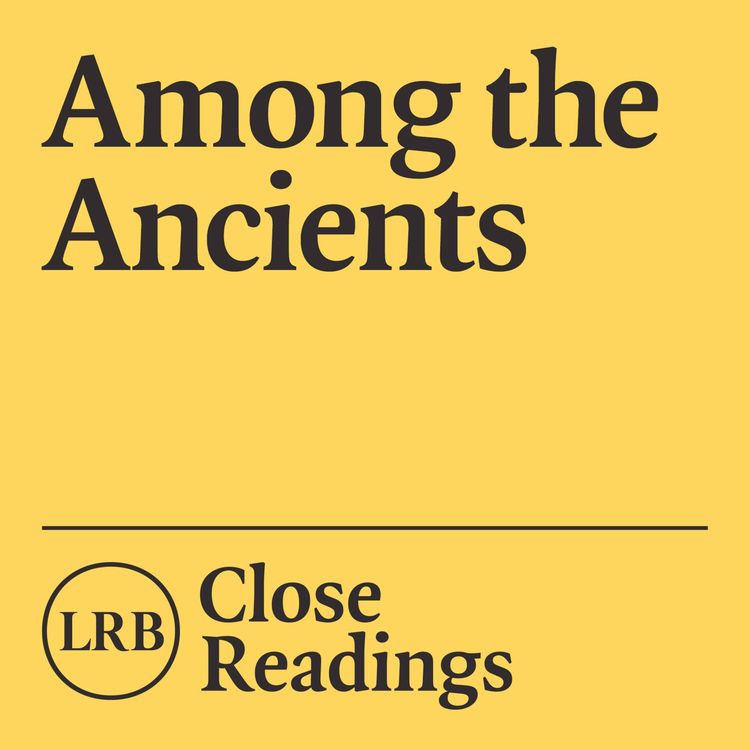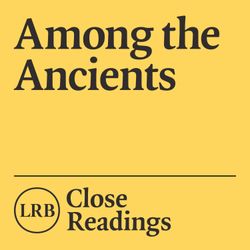Share

Among the Ancients
Euripides
Euripides was the youngest of the fifth-century Athenian tragedians, and is often described as the most radical. But how daring was he? How far did he push the boundaries of dramatic form? Focusing on Medea and Hippolytus, Emily and Tom discuss the ways Euripides sought to shock his audiences, make them laugh, and explore their anxieties in a time of cultural change.
Non-subscribers can only hear extracts from most of the episodes in this series. To listen in full, and to all our other Close Readings series, subscribe:
Directly in Apple Podcasts: https://apple.co/3pJoFPq
In other podcast apps: lrb.me/closereadings
Further reading in the LRB:
Robert Cioffi: Euripides Unbound
https://www.lrb.co.uk/the-paper/v46/n18/robert-cioffi/euripides-unbound
Anne Carson: Euripides to the Audience
https://www.lrb.co.uk/the-paper/v24/n17/anne-carson/euripides-to-the-audience
Emily Wilson is Professor of Classical Studies at the University of Pennsylvania and translator of the 'Odysse'y and the 'Iliad'. Thomas Jones is an editor at the London Review of Books and host of the LRB Podcast.
More episodes
View all episodes

1. Introducing Among the Ancients
05:56||Ep. 1Emily Wilson and Thomas Jones introduce their series on the great works of Greek and Roman literature, from Homer to Horace, and discuss some of the themes and preoccupations running through the twelve episodes.The authors under discussion in this series will be: Homer (Iliad and Odyssey), Sappho, Sophocles, Euripedes, Aristophanes, Catullus, Lucretius, Virgil, Horace, Ovid and Seneca.Non-subscribers can only hear extracts from most of the episodes in this series. To listen in full, and to all our other Close Readings series, subscribe:Directly in Apple Podcasts: https://apple.co/3pJoFPqIn other podcast apps: lrb.me/closereadingsEmily Wilson is Professor of Classical Studies at the University of Pennsylvania and translator of the 'Odysse'y and the 'Iliad'. Thomas Jones is an editor at the London Review of Books and host of the LRB Podcast.
2. The 'Iliad'
48:34||Ep. 2In their first episode of Among the Ancients, Emily and Tom begin with a beginning, Homer's Iliad: its depictions of anger and grief, of capricious gods and warriors’ bodies, and the sheer narrative force of Homer’s epic of the Trojan War.Non-subscribers can only hear extracts from the rest of the episodes in this series. To listen in full, and to all our other Close Readings series, subscribe:Directly in Apple Podcasts: https://apple.co/3pJoFPqIn other podcast apps: lrb.me/closereadingsRead more in the LRB:James Davidson: Like a Meteoritehttps://www.lrb.co.uk/the-paper/v19/n15/james-davidson/like-a-meteoriteEdward Luttwak: Homer Inc.https://www.lrb.co.uk/the-paper/v34/n04/edward-luttwak/homer-incColin Burrow: The Empty Bathhttps://www.lrb.co.uk/the-paper/v37/n12/colin-burrow/the-empty-bathEmily Wilson is Professor of Classical Studies at the University of Pennsylvania and translator of the 'Odysse'y and the 'Iliad'. Thomas Jones is an editor at the London Review of Books and host of the LRB Podcast.
3. The 'Odyssey'
09:21||Ep. 3In episode two of Among the Ancients, Tom and Emily turn to Homer’s Odyssey. They discuss the twisting, turning nature of both the narrative and its hero, the poem’s complex interrogation of the idea of ‘home’, and the violence Odysseus brings with him on his return from the Trojan War.Non-subscribers can only hear extracts from most of the episodes in this series. To listen in full, and to all our other Close Readings series, subscribe:Directly in Apple Podcasts: https://apple.co/3pJoFPqIn other podcast apps: lrb.me/closereadingsFurther reading in the LRB:David Quint: Poor Cyclopshttps://www.lrb.co.uk/the-paper/v31/n12/david-quint/poor-cyclopsBarbara Graziosi: Where’s the Gravy?https://www.lrb.co.uk/the-paper/v31/n16/barbara-graziosi/where-s-the-gravyColin Macleod: Homer's Godshttps://www.lrb.co.uk/the-paper/v03/n14/colin-macleod/homer-s-godsEmily Wilson is Professor of Classical Studies at the University of Pennsylvania and translator of the 'Odysse'y and the 'Iliad'. Thomas Jones is an editor at the London Review of Books and host of the LRB Podcast.
4. Sappho
11:59||Ep. 4In the third episode of Among the Ancients, Emily and Tom move from epic to lyric, with the poems of Sappho, or what remains of them. They consider what we know, and don’t know, about her life, and how her poetry challenges the heroic tradition, both in its subversion of Homeric ideas of war and nostos, and in its playful use of language.Non-subscribers can only hear extracts from most of the episodes in this series. To listen in full, and to all our other Close Readings series, subscribe:Directly in Apple Podcasts: https://apple.co/3pJoFPqIn other podcast apps: lrb.me/closereadingsFurther reading in the LRB:Emily Wilson:https://www.lrb.co.uk/the-paper/v26/n01/emily-wilson/tongue-breaksTerry Castle:https://www.lrb.co.uk/the-paper/v21/n19/terry-castle/always-the-bridesmaidMary Beard:https://www.lrb.co.uk/the-paper/v12/n19/mary-beard/sappho-speaksPeter Green:https://www.lrb.co.uk/the-paper/v37/n22/peter-green/what-we-knowEmily Wilson is Professor of Classical Studies at the University of Pennsylvania and translator of the 'Odysse'y and the 'Iliad'. Thomas Jones is an editor at the London Review of Books and host of the LRB Podcast.
5. Sophocles
12:50||Ep. 5In the fourth episode of Among the Ancients, Emily and Tom ask: what was it like to go to the theatre in Athens in 468 BC? And how far do modern ideas about tragedy, derived from Aristotle, apply to Sophocles’ plays? They then look in more detail at Oedipus Tyrannos and Antigone and what the plays have to say about agency and knowledge, and consider issues particular to Sophocles’ time, including civic responsibility and the role of immigrants in Athenian society.Non-subscribers can only hear extracts from most of the episodes in this series. To listen in full, and to all our other Close Readings series, subscribe:Directly in Apple Podcasts: https://apple.co/3pJoFPqIn other podcast apps: lrb.me/closereadingsFurther reading in the LRB:Hugh Lloyd Jones:https://www.lrb.co.uk/the-paper/v02/n24/hugh-lloyd-jones/gods-and-heroesJames Davidson:https://www.lrb.co.uk/the-paper/v21/n19/james-davidson/an-easy-layEmily Wilson is Professor of Classical Studies at the University of Pennsylvania and translator of the 'Odysse'y and the 'Iliad'. Thomas Jones is an editor at the London Review of Books and host of the LRB Podcast.
7. Aristophanes
11:35||Ep. 7In their sixth episode of Among the Ancients, Emily and Tom discuss the comedies of Aristophanes, in particular Clouds and Lysistrata. How did an Aristophanes comedy differ from a satyr play? Was he a conservative or a radical? And what happened to comedy after Aristophanes?Non-subscribers can only hear extracts from most of the episodes in this series. To listen in full, and to all our other Close Readings series, subscribe:Directly in Apple Podcasts: https://apple.co/3pJoFPqIn other podcast apps: lrb.me/closereadingsFurther reading in the LRB:Emily Wilson:https://www.lrb.co.uk/the-paper/v43/n20/emily-wilson/punishment-by-radishThomas Jones:https://www.lrb.co.uk/the-paper/v24/n19/thomas-jones/short-cutsEmily Wilson is Professor of Classical Studies at the University of Pennsylvania and translator of the 'Odysse'y and the 'Iliad'. Thomas Jones is an editor at the London Review of Books and host of the LRB Podcast.
8. Catullus
11:00||Ep. 8For the second half of their Among the Ancients series, Emily and Tom move to Ancient Rome, starting with the late Republican poet Catullus. Described by Tennyson, somewhat misleadingly, as ‘the tenderest of Roman poets’, Catullus combined a self-conscious technical virtuosity with a broad emotional range and a taste for paradox, often using obscene diction to skirt across the boundaries of gender and aesthetics.Non-subscribers can only hear extracts from most of the episodes in this series. To listen in full, and to all our other Close Readings series, subscribe:Directly in Apple Podcasts: https://apple.co/3pJoFPqIn other podcast apps: lrb.me/closereadingsFurther Reading in the LRB:Elspeth Barker:https://www.lrb.co.uk/the-paper/v14/n19/elspeth-barker/o-filth-o-beastlinessWilliam Fitzgerald:https://www.lrb.co.uk/the-paper/v28/n04/william-fitzgerald/badmouthing-cityEmily Wilson is Professor of Classical Studies at the University of Pennsylvania and translator of the 'Odysse'y and the 'Iliad'. Thomas Jones is an editor at the London Review of Books and host of the LRB Podcast.
9. Lucretius
10:15||Ep. 9In their eighth episode Emily and Tom look at a contemporary of Catullus, Lucretius, and the only poem we have from him, De rerum natura (The Nature of Things), which sets out ideas about how to live one’s life based on the Epicurean philosophical tradition, embracing friends, gardens, materialism and moderation.Non-subscribers can only hear extracts from most of the episodes in this series. To listen in full, and to all our other Close Readings series, subscribe:Directly in Apple Podcasts: https://apple.co/3pJoFPqIn other podcast apps: lrb.me/closereadingsFurther reading in the LRB:Richard Jenkyns: Coaxing and Seducinghttps://www.lrb.co.uk/the-paper/v20/n17/richard-jenkyns/coaxing-and-seducingEmily Wilson is Professor of Classical Studies at the University of Pennsylvania and Thomas Jones is an editor at the London Review of Books.